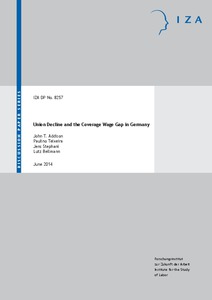Union decline and the coverage wage gap in Germany
"Using linked employer-employee data, this paper estimates the effect of collective bargaining coverage on wages over an interval of continuing decline in unionism. Unobserved firm and worker heterogeneity is dealt with using two establishment sub-samples, comprising collective bargaining joine...
| Main Authors: | , , , |
|---|---|
| Institution: | ETUI-European Trade Union Institute |
| Format: | TEXT |
| Language: | English |
| Published: |
Bonn
2014
IZA |
| Subjects: | |
| Online Access: | https://www.labourline.org/KENTIKA-19118088124919362609-union-decline-and-the-coverage.htm |
| Summary: | "Using linked employer-employee data, this paper estimates the effect of collective bargaining coverage on wages over an interval of continuing decline in unionism. Unobserved firm and worker heterogeneity is dealt with using two establishment sub-samples, comprising collective bargaining joiners and never members on the one hand and collective bargaining leavers and always members on the other, each in combination with subsets of worker job stayers. The counterfactuals are then reversed for robustness checks. Joining a sectoral agreement is found always to produce higher wages, while exiting a sectoral agreement no longer produces wage losses if the transition is to a firm agreement. Leaving a firm agreement to non-coverage also leads to wage reductions, while joining one from non-coverage seems decreasingly favourable. The reverse counterfactuals yield correspondingly smaller estimates (in absolute value) of wage development than reported for the initial counterfactuals. Finally, although small, the union wage gap persists." |
|---|---|
| Physical Description: | 40 p. Digital |

